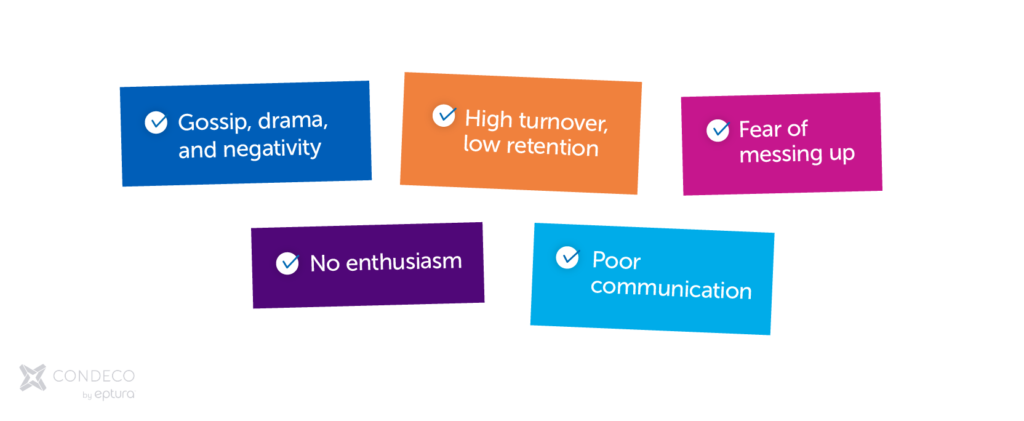
Workplace culture is a topic that’s high on the agenda of most organizations. It can impact everything from retention to productivity rates. It can be the making or breaking of a business. But what exactly is workplace culture, why does it matter and how can you judge when it needs to be changed?
What is workplace culture?

Workplace culture is tricky to define, but easy to feel. It’s at its most obvious when lacking, or something is wrong. It’s probably at its best when unnoticeable but happily accepted by all employees.
In essence, it’s what happens when people get together for a common purpose. You may choose to define it as a set of values, the customs and traditions of your business, or the behavior and attitude of those you employ. The truth is, it’s all of these.
Why workplace culture is important
Some businesses can succeed in a climate of fear and distrust. But this is the exception rather than the rule.
The culture of the workplace is the atmosphere – almost like the air. If it gets toxic then you’ll start to notice the negative impacts. There will be grim-faced, secretive meetings, ironic jokes passed around in meetings and, worst of all, there will be departures of the best people who rightly believe they can find a better working life elsewhere.
The positive impact of a good workplace culture
Productivity
Happy people are more often than not productive. They’re going to be willing to put in the hard work when they need to and feel empowered and motivated to better their skills.
The old question of ‘what gets you out of bed in the morning?’ will be easy to answer for those in a positive culture. The impact on profits will be noticeable.
Wellbeing

The mental health of your employees is incredibly important, and workplace culture can significantly affect this. It’s not just about people taking sick leave because they’re facing so much stress. It’s about their general state of mind. If their employer is making them feel depressed and anxious how can you expect the best possible results?
Recruitment
‘The Great Resignation’ of 2021 was a real thing. After Covid, people were questioning their priorities in life and a workplace that made them feel unhappy was not one of them.

A positive culture is something that job hunters are prioritizing, sometimes even above salary. Not only is it a great tool to bring people in, but it also helps both you and those applying for your roles to decide if they will be a good fit for your business.
A positive workplace culture is therefore a magnet that attracts and retains good people.
Team morale

Culture and morale go together. You might not be able to define it specifically, but you’ll certainly notice when something is amiss. Having a positive workplace culture goes beyond individual employees and helps teams to feel empowered, trusted and confident in everything they do.
Positive people are more willing to go that extra mile and support each other when the going gets tough. They’re also more likely to come up with creative ideas that push your business forward.
How to understand you workplace culture
Culture isn’t a list of benefits on a piece of paper. It isn’t a set of values on your intranet pages. It’s definitely not just free fruit and pool tables. It’s about making sure that people are happy.
The best way to get an idea of workplace culture is to observe. How do people treat one another? How do they interact with new people? How do your managers and their team interact? Are people interacting between tasks, chatting about their weekend plans, or going to get lunch together?
Alternatively you can just ask. Surveys can be a great place to find out what people really think about working for your company. But they MUST be truly anonymous, otherwise people won’t give their honest feedback.
You also need to be honest. If you want to take a deeper look at the culture of your business, you need to be prepared to uncover things you don’t like and be willing to take action to improve them.
How to spot a toxic workplace culture

You may think it’s easy to spot a toxic workplace culture. But it can be subtle and the symptoms are under the surface rather than manifesting themselves in a room full of people shouting at each other.
Here are some of the things that may indicate your culture is becoming, or already is, toxic.
Gossip, drama, and negativity
There probably isn’t an office in the world that doesn’t have some type of gossip – that’s perfectly normal. But sometimes the rumor mill goes into high gear. If you feel like your average Monday is filled with never ending whispers, aggressive comments and negativity, then this could well be a sign of a toxic workplace.
High turnover, low retention
“Where did Caroline go?”, “When are we finally going to replace George?”. If the entrance to your office feels like a revolving door for employees leaving and arriving then that’s a sign of toxicity.
Culture can be one of the biggest reasons for driving people away. Of course, there are different reasons why people leave their jobs – and some have nothing to do with the job, company or the culture. However, if you see a mass exodus or are struggling to recruit, then you might want to think about the surrounding environment.
Fear of messing up
Nobody wants to make a mistake, but we all do at some point and hopefully we learn from them. There’s a huge difference between the occasional facepalm and feeling Sunday night dread because you don’t want to go into the office the following day. If your people anticipate that they will be punished for any step out of line then that is a huge red flag for a toxic environment.
No enthusiasm
An unenthusiastic office is palpable. There’s no energy in meetings. Nobody wants to innovate. Everyone is checking LinkedIn for their next job. If people react to tasks or good news with all the enthusiasm of a visit to the dentist, then an alarm bell should sound.
Poor communication
If you notice that no one chats, smiles, jokes, or gives each other a boost, then a toxic culture could be developing. Another red flag can be the informal office grapevine being better at communicating news than the official company network.
Positive cultures are also open and honest cultures. Managers and those in charge should never try to hide anything from their staff, as it breeds distrust and contempt. Even if you’re delivering the truth, the natural inclination will be to think there’s a hidden agenda behind the words.
How to change your workplace culture
If you’ve spotted something toxic within your culture then it’s important that you take positive action. There’s no point sticking your head in the sand.
Culture is something that forms organically, but that doesn’t mean that you can’t influence it, especially in the areas that need a bit of extra love. Regardless of how big your team is, managers need to prioritize culture and positivity.
Get involved in the early stages
People form their impression of a culture very early in their careers. Even if your team is big, try to show your face during the formative stages of a new starter’s time. They will need to see a supportive and collaborative culture from the top down. They’ll want to see culture in action rather than just positive words.
Progression plans

We all need purpose in our lives. People thrive when they know they are going places, and it ensures that they work hard to achieve those goals. Give each employee a clear progression plan so they know exactly what they need to do to reach that next stage. Nobody should be asking “what am I doing here?”.
Shout about success
It’s easy and quite cathartic to have a moan when there’s a slight hiccup. For some reason, we’re less likely to celebrate when our team does good work. Shout out when things go well. Praise those involved and share the success with the entire business. A little employee recognition goes a long way in improving a culture.
Just ask

Culture is about people and knowing what you people actually want is a huge advantage.
You might find out that they don’t really care about that new ping pong table. What they really want is to start and end at flexible times so work fits around their life. It’s easy to assume but reality is always capable of throwing up surprises.



